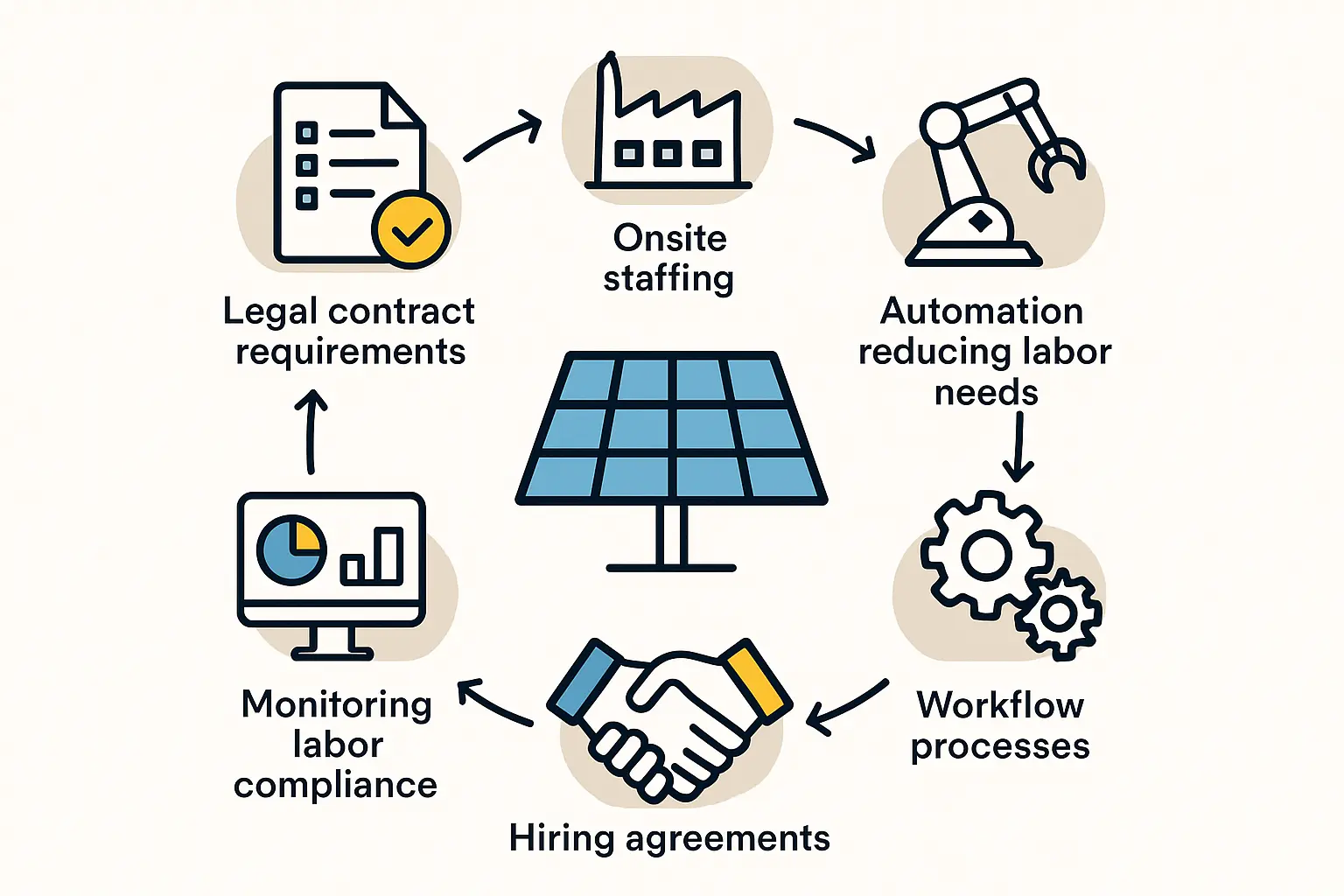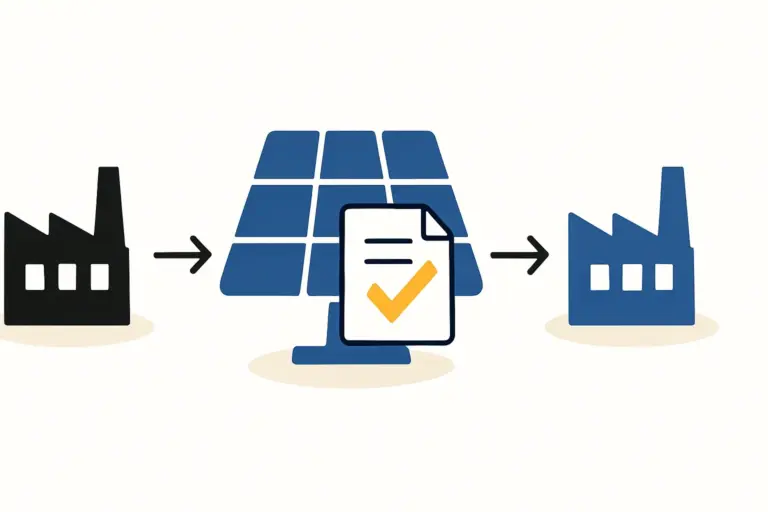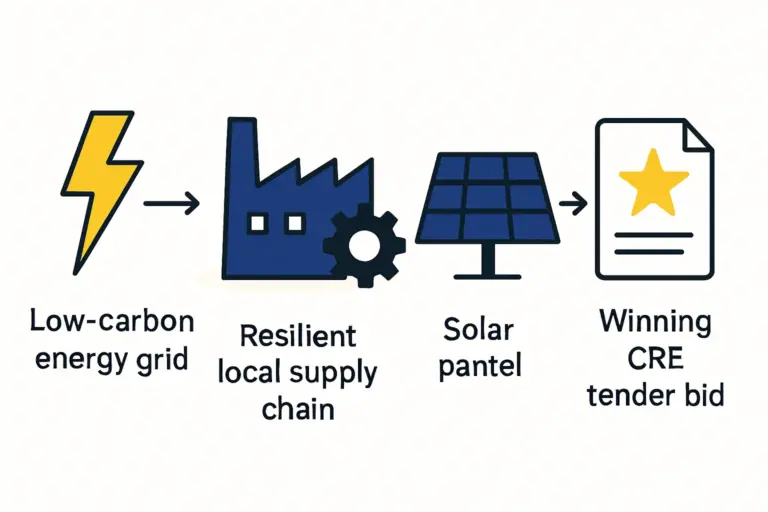An investor considering a new solar module factory in Europe might look at France and see a compelling proposition: a central location, a strong industrial base, and government support for green technology. However, their financial models soon run into a significant variable: the French labor market. Its reputation for complexity often precedes it, leaving many to wonder what that means in practice for a new manufacturing operation.
This guide provides a clear, business-focused overview of the key aspects of French labor law relevant to establishing a solar manufacturing plant. Designed for entrepreneurs and business leaders, it covers the fundamental principles of staffing, compensation, and compliance needed to build an accurate and realistic operational plan. Far from being a mere legal formality, understanding these regulations is a critical component of strategic financial planning.
The Foundation: Understanding the French Labor Code (Code du Travail)
At the heart of French employment law lies the Code du Travail. This comprehensive legal text governs nearly every aspect of the employer-employee relationship, from hiring and working hours to termination and workplace safety. Spanning over 3,000 pages, it is known for its detailed provisions that prioritize employee protection.
For an international investor, the Code du Travail creates a highly regulated environment. These national laws are often supplemented by collective bargaining agreements (conventions collectives) specific to certain industries—such as the metallurgy sector, which would likely cover solar module manufacturing. These agreements can introduce additional rules on minimum salaries, working conditions, and notice periods. A successful business plan must account for both the national labor code and the relevant industry-specific agreements.
The 35-Hour Work Week: Myth vs. Reality for Manufacturers
Perhaps the most famous—and often misunderstood—aspect of French labor law is the 35-hour work week. It’s crucial to understand that this is not a strict cap on working hours but a legal threshold that triggers overtime pay.
In a manufacturing context of standard shift work, the financial implications are direct:
-
Standard Overtime: Hours worked beyond 35 in a week must be paid at a higher rate. The standard rate is a 25% premium for the first eight hours of overtime (from the 36th to the 43rd hour) and a 50% premium for any hours thereafter.
-
Annual Planning: Companies can negotiate agreements to average working hours over a longer period, providing flexibility for handling fluctuations in production demand. However, there are still annual caps on the total number of overtime hours an employee can work.
For a solar factory running multiple shifts, modeling labor costs accurately means factoring in these overtime premiums. A robust operational model for planning your solar factory workforce must account for these variables to prevent unforeseen expenses.
Hiring and Employment Contracts: Key Considerations
French law strongly favors permanent, open-ended employment. This principle is reflected in the two primary types of employment contracts:
The Permanent Employment Contract (Contrat à Durée Indéterminée – CDI)
The CDI is the standard and default form of employment contract in France. It has no end date and provides employees with significant job security. Terminating a CDI is a highly regulated process that requires specific legal grounds, making the initial hiring decision particularly important.
The Fixed-Term Employment Contract (Contrat à Durée Déterminée – CDD)
A CDD can only be used in specific situations defined by law, such as replacing an absent employee, managing a temporary increase in business activity, or for seasonal work. It cannot be used to fill a long-term position integral to the company’s normal operations. For a new factory, a CDD might be used for initial, project-based setup tasks, but the core production staff will almost certainly need to be hired on CDI contracts.
Contracts typically include a trial period (période d’essai), which allows either party to terminate the contract with minimal notice. The maximum duration is set by law and the relevant collective agreement, usually lasting two to four months for technicians and managers, with the possibility of a single renewal.
The Real Cost of Labor: Understanding Social Charges (Charges Sociales)
For many investors, the most significant “aha moment” in their financial modeling comes from understanding French social charges. An employee’s gross salary (salaire brut) is only part of the total labor cost; employers must also pay substantial social security contributions.
These charges fund France’s extensive social welfare system, including healthcare, family benefits, unemployment insurance, and pensions.
A Crucial Business Metric: As a general rule, an investor should budget for employer social charges amounting to approximately 40-45% of the employee’s gross salary.
To illustrate:
-
If a production line technician is offered a gross monthly salary of €3,000.
-
The total cost to the company will be approximately €3,000 + 45% = €4,350 per month.
-
The employee’s net take-home pay (salaire net) will be around €2,300, after their own employee contributions are deducted.
This “multiplier effect” is a fundamental component of the investment requirements for a solar factory and must be accurately reflected in any business plan to ensure financial viability. Based on experience from J.v.G. turnkey projects, underestimating these costs is one of the most common planning errors.

Navigating Termination and Dismissal
Terminating a CDI contract in France is a formal, legally defined process. It requires a “real and serious cause” (cause réelle et sérieuse), which can be related to either personal conduct (e.g., misconduct, incompetence) or economic reasons (e.g., restructuring, financial difficulties).
The procedure involves formal notifications, mandatory meetings with the employee, and strict notice periods. Failure to follow the correct procedure can lead to legal challenges and significant financial penalties for wrongful dismissal. This risk underscores the importance of having robust HR practices and access to local legal expertise from the outset.

Frequently Asked Questions (FAQ)
-
What is the SMIC in France?
The SMIC (Salaire Minimum Interprofessionnel de Croissance) is the legal minimum wage in France. It is indexed to inflation and updated at least once a year. As of early 2024, the gross monthly SMIC for a 35-hour week is over €1,700. However, collective bargaining agreements in the manufacturing sector often stipulate higher minimums based on job classification and experience. -
How influential are trade unions in French manufacturing?
Trade unions and employee representative bodies (Comité Social et Économique – CSE) are an integral part of the French industrial landscape. Companies over a certain size are legally required to have a CSE. While union membership rates may be lower than in other European countries, their influence in negotiations and workplace relations remains significant. Proactive and transparent dialogue is simply good business practice. -
Do these labor laws apply to expatriate managers?
Yes, for the most part. Any employee working on French territory under a French employment contract is subject to the Code du Travail. While specific arrangements can be made for expatriates concerning benefits or relocation packages, the core rules on working hours, contract types, and termination procedures will still apply. -
How long does a typical hiring process take for a new factory?
Building a full team for a 20-50 MW factory can take several months. The process involves defining roles according to the relevant collective agreement, navigating formal contract procedures, and observing notice periods for candidates who are already employed. Strategic workforce planning should begin early in the project timeline.
Next Steps in Your Planning Journey
France presents a viable and attractive location for solar manufacturing, but its labor environment demands careful and informed planning. The regulations, while complex, are predictable and manageable with the right expertise. The key to success is not to be an expert in the Code du Travail yourself, but to integrate its principles into your financial and operational models from day one.
Understanding how these labor dynamics fit within a complete financial projection is the logical next step. Examining a detailed business plan can provide critical context, transforming abstract legal concepts into concrete figures that guide strategic decisions.







